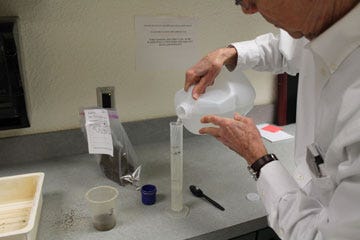
Opening the brochure, Solutions for Your Life, for the University of Florida's Institute of Food and Agriculture (UF/IFAS) Extension, readers will find Extension, "provides scientific knowledge and expertise to the public," according to the brochure, on commercial farming, marine science, 4-H education and more.
Ralph Hendel, master gardener of two years, said Extension exists to answer questions about fruit trees, palms, gardens, lawns, insects, or anything related to horticulture. He said if someone has a problem with a lawn he or she can bring in a sample of sod, half dying and half good. The master gardener can look for insects, good roots, and anything else that might be the cause of the lawn dying. Hendel also said master gardeners can advise people on what plants to grow, when, and in what kind of soil. He also said people bring in branches to the office looking to find out what is growing on their properties.
Pointing out a rotating tower of documents, Hendel said the Extension office has extensive, scientific documents available to visitors on types of grasses, vegetables, insects, and more. He said all of the information comes from the University of Florida experimental farm and data collected in the Extension office's lab.
In an unplanned demonstration, Hendel performed a soil test. First, he shook a mound of dirt through a strainer. He took a cup of that soil and stirred in purified water. He said the solution would normally have to sit for at least a half an hour but no more than two hours. Like a baking show, Hendel had another sample ready and went about testing its pH level. The device used to do so was no taller than two inches and about the size of a typical college ruled notebook. Connected to it was a vertical arm with an adjustable grey rod, Hendel dipped into the second sample. He said pH measures between 0 and 14; anything below 7 is acidic while anything above is alkaline. The test result for the sample he measured was 6.8. Hendel recorded the number along with the sample's owner by hand in a black book, which also contained a list of fruits and vegetables next to their ideal soil pH levels. He said the majority of vegetables thrive in soil with a pH between 5.5 and 7. He also said they could send a sample to a lab in Gainesville to obtain the soil's nutrition level, an indicator of how much fertilizer to use.
Hendel also pointed out the two microscopes in the lab, one with a greater zoom to find microbes and fungi invisible to the human eye. Mabel Stuart, currently a trainee in the Florida Master Gardener Program, pulled up several sample pictures taken through the microscopes on a computer next to them. She showed pictures of a southern army worm from a tomato plant, an aphid with a parasite, a cottony cushion scale, an alternia scraped from a pepper, and a nematode.
Hendel said commercial farmers can deal with nematodes but residential gardeners cannot. He said he advises them to rotate their crops. He said if you plant tomatoes this year, then "wait two to three years."
Hendel said master gardeners are volunteers, but the Extension supports its work mainly through sales of flowers and other plants. He walked a few paces into the cold from the Extension office to the greenhouse where these plants grow. Inside the warm greenhouse, eight tables supported groups of plants and a number of plants sat in hanging baskets on the ground. He said the flora there grows well with no disease or insects. In the greenhouse with Hendel, Stuart said master gardeners "sterilize everything." Hendel said, "It's our reputation."
Ralph Hendel earned the title of master gardener through Extension's Florida Master Gardener Program. The official Master Gardener Program website by UF/IFAS states, "Participants complete a 50-hour (or longer) training course sponsored by the University of Florida and the local county Extension office." The site also says that new master gardeners must serve 75 hours of volunteer service within the first year of certification. Hendel said he earns 5.5 hours a day, 4 days a week volunteering at the Extension office.
Hendel spoke about why someone might wish to become a master gardener. He said the program is good for retirees; it gets them involved. He said master gardeners help people and can give the best advice. They also teach at schools, he said. Hendel said he's always had a great interest in learning and the class is "quite frankly unbelievable."
Not only is the Extension office available to help, Hendel said, but the Extension's Electronic Data Information Source (EDIS) is available on the Internet. He said the best way to access information is to use a search engine and type the subject in question and then the letters "edis." Performing the search on Google's search engine, "celery edis," yields a page of search results linking to EDIS scientific publications related to celery. Hendel said people can get answers on EDIS. "It makes them feel good. It empowers them," he said.
This article originally appeared on Santa Rosa Press Gazette: Santa Rosa Extension: It's time to prepare
